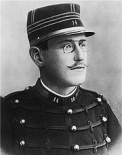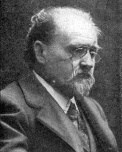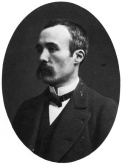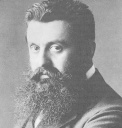Important days
30. 10. 2009
Dreyfus Affair
Alfred Dreyfus, thirty-five year old French officer was arrested on 15 October 1894. He was accused by the military court of treason upon a handwritten letter which had been got hold of by the French intelligent service. The authorship of the letter was ascribed to Dreyfus. During the court-martial, which was faked by military circles (in particular by then-Minister of War and his generals) and in which two pieces of faked evidence were used, Dreyfus was condemned to the public degradation and life imprisonment on Devil's Island. The fact that he was of Jewish origin and had come from Alsace made things worse to him. He could have had closer to French enemies. His barrister Démante stated that "if Captain Dreyfus was not of Jewish origin, he would not be arrested in the prison Cherce-Midi"
However, when George Picquart became a new head of the Counter-Intelligence Service, he ordered new investigation into this matter, during the course of which a new letter to Lieutenant Esterhazy was found; the handwriting was identical to that one which had been a basis for his imprisonment. When Picquart informed about it his superiors, he was, due to his discontent with classification of the report, detached to Tunisia first and then he was condemned as he had handed over the information to senator Scheurer-Kestner who published it. At that time also the writer Émile Zola decided to intervene in the case and published an open letter to the President "J´accuse!" (I accuse), in which he demanded fair judicial proceedings and publishing of circumstances of the Dreyfus's condemnation. He managed to achieve that in the lawsuit when Zola was accused of vilification and "belittling of the army and condemned to the 3000-franc fine and one-year imprisonment. Subsequent President Georges Clemenceau was his barrister then.
Number of French intellectuals stood up for Zola (Anatol France, Marcel Proust) and to support him and Dreyfus they established the League of Human and Civil Right. Thus Dreyfus became a symbol of human rights, farness and freedom. His opponents, on the contrary, defended the army as a symbol of national power and fought for priority of national interests over interests of individuals.
In a repetitive lawsuit, which was ordered by the government in September 1899, Dreyfus was found guilty again and condemned to ten-year imprisonment. Overfatigued and broken he appealed for mercy which was granted to him by a new President Émile Loubet. He was fully rehabilitated as late as in 1906 when Georges Clemenceau became the French Prime Minister and Georges Pisquard became the Minister of War. In the course of the World War One he was promoted to the rank of colonel and decorated with the National Order of the Legion of Honour.
The lawsuit instigated a violent anti-Semitic campaign. It lead to attacks against the republican regime and democratic freedoms and divided the French society. The army and the Catholic Church as protectors of traditional values, conservative right wing, nationalistic parties, royalists and financial circles used the accusation of the Jewish officer to demonstrations of patriotism, glorification of army, anti-Semitic phobias and calumniation of the republican regime. The French anti-Semitic League, in which members of all social classes were assembled, was disseminating the anti-Semitic propaganda and its objective was to fight against a secret plot of Jewish financiers who were accused of responsibility for the state of the society.
Journalist Theodor Herzl who was a witness of the Dreyfus's public degradation reported about those events from France as a Parisian correspondent. After he became a witness of instigated anti-Semitic passions (shouts of crowds "Death to traitor" "Death to Jews") he came to the conclusion that Jews are not safe in Europe and that anti-Semitism would never disappear. Therefore he became a founder and a leader of the political Zionism that was striving for establishment of a Jewish state. His book "Jewish State" published in Vienna in 1896 is deemed as a basic writing of the world Zionism.
The consequence of the Dreyfus affair was the reduction of the army influence and the army got under greater control of the public and church; it eventually resulted in the end of the Roman Catholic Church as a state church in France in 1905. The affair also influenced the climate in the French society through popularization of republican and democratic values. On the other hand, thanks to the affair also an increase of adherents of non-democratic right wing took place; however these forces (unlike Germany or Italy) never won a dominant support of the public.








